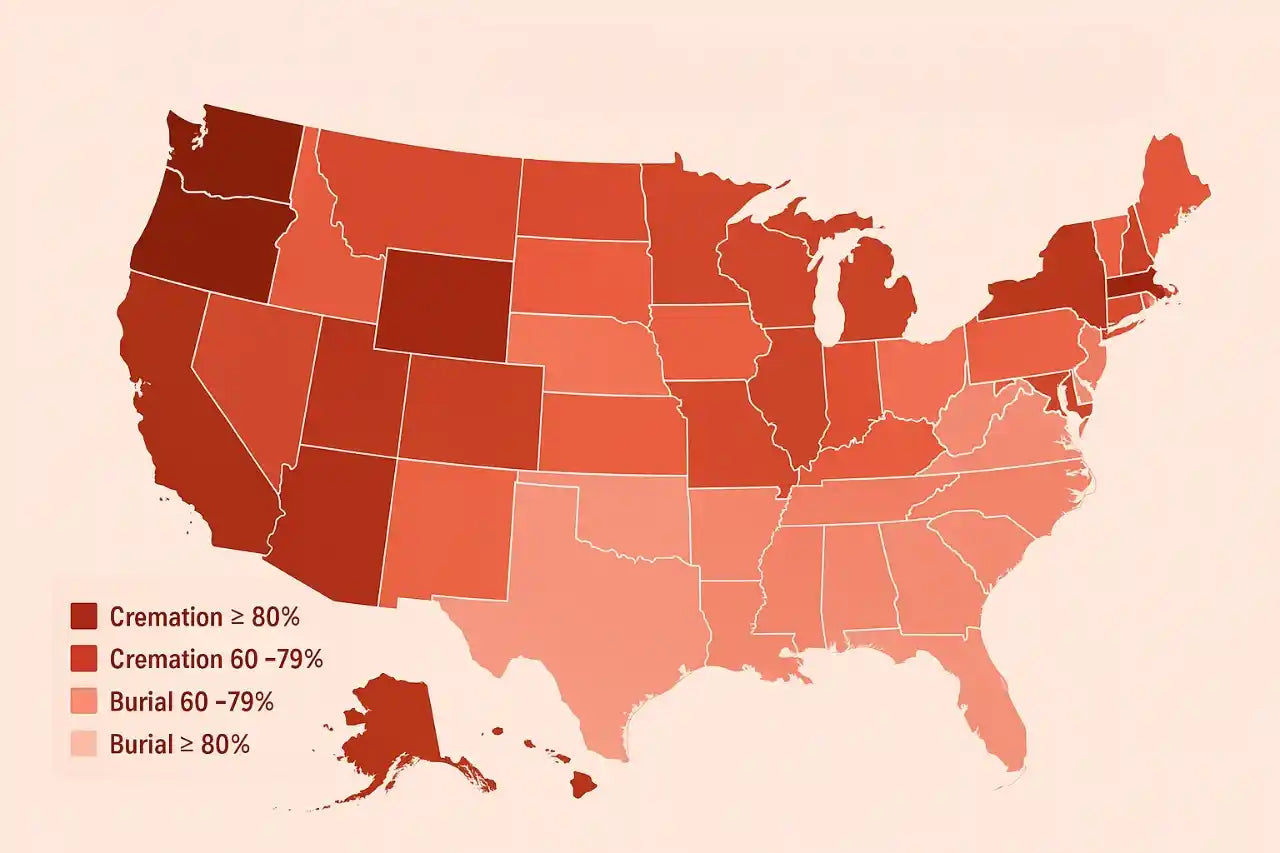Funerals serve as a bridge between the living and the departed, offering solace, commemorating lives, and providing a structured means for the living to navigate grief. The duration and nature of these ceremonies vary widely across different faiths, reflecting various beliefs about life, death, and the afterlife. This article explores the funeral rites of major world religions, including Christianity, Hinduism, Islam, Judaism, Protestantism, and Mormonism, highlighting key practices and the average duration of these sacred rituals.
Factors That Influence A Funeral's Duration
In addition to religious rituals, several other arrangements and settings can extend or shorten a funeral or memorial service.
Funeral services fall into two broad categories: burial or cremation. Burial services typically take more time than cremations because there are more things to do. A cremation service usually culminates in a cremation without much delay. However, a burial often involves a formal gathering or funeral procession to the burial site after the service.
Elements of the Funeral Service
A funeral home service will offer different services and assistance for conducting your loved one's final service. They may offer standard packages that cover services that most families want. Depending on the family’s desires, funeral homes may also offer additional services like floral arrangements or larger halls. These added elements may extend a funeral's duration, and their absence can shorten the service.
Reception and Location
Funerals that involve a separate reception or wake can take up more time, even if the formal service is short. Some funerals include a separate viewing day or hour, while others serve buffets for visitors. These additional gatherings can add hours or days to the funeral proceedings.
Funerals that host the service in one location, a funeral home, for instance, and the burial in a separate location, a cemetery, will take more time considering the transportation and commute between the two locations.
Christian Funeral Ceremonies
Catholic Funerals: Will typically involve three main stages: the Vigil (or Wake), the Funeral Mass, and the Committal. The Vigil, often held the night before the Mass, can last from one to three hours. The Funeral Mass is the central rite and may last about an hour. The Committal at the graveside is shorter, usually around 20-30 minutes.
Protestant Funerals: Ceremonies will vary significantly across denominations, but they generally focus on prayers, scripture readings, and hymns, reflecting the deceased's faith. A service might last from 30 minutes to an hour, not including additional time for visitation or graveside services.
Hindu Funeral Ceremonies
Hindu funeral rites begin immediately after death and include several stages, culminating in cremation within 24 hours. The entire process is guided by rituals, including the preparation of the body, the cremation ceremony, and post-cremation rites, extending over ten days to allow for the mourning period and purification rites for the family. The core cremation ceremony typically lasts a few hours, but the associated practices and final rites stretch across several days.
Islamic Funeral Ceremonies
Islamic funerals are characterized by their simplicity and swiftness. They are typically conducted within 24 to 48 hours after death. The key components include the Ghusl (body washing), the Janazah (funeral prayer), and the burial. The Janazah prayer is brief, usually taking about 5 to 15 minutes, but preparation and burial practices may extend the total duration to a few hours. Islam emphasizes quick burial to honor the deceased, with extended mourning practices kept private and simple.
Jewish Funeral Ceremonies
Jewish funerals are known for their rapid occurrence after death, ideally within 24 hours, following the principle of “K’vod HaMet” (honoring the dead). The ceremony itself, including prayers and eulogies, may last around 30 minutes to an hour. It strongly emphasizes simplicity and returning the body to the earth. This is followed by a week-long mourning period called “Shiva,” during which the community supports the bereaved family.
Mormon (Latter-Day Saints) Funerals
Mormon funerals reflect both the Christian belief in resurrection and specific LDS traditions. Services typically include music, prayers, and eulogies, lasting about an hour, similar to other Christian services. The funeral will typically begin with an open-casket viewing for guests to visit the body and say goodbye. Unique aspects include a graveside dedication of the grave, adding a brief additional component to the ceremony.
Scientology
Scientology funeral ceremonies offer a unique perspective on the concept of death, focusing on the belief in the immortal nature of the spirit, or "thetan". The funeral service, typically led by a Scientology minister, provides an opportunity for friends and family to celebrate the life of the departed, acknowledging their accomplishments and wishing them well in their onward journey.
Unlike traditions that might prescribe specific rituals for the treatment of the body, Scientology places little emphasis on the physical remains, allowing for either cremation or burial based on personal or familial preference. While specific information on the duration of Scientology funeral ceremonies is not explicitly detailed, these services are characterized by several key activities:
Celebratory Focus: The ceremony celebrates the departed's life and contributions, focusing on their spiritual journey beyond the physical realm.
Readings and Messages: Readings from L. Ron Hubbard, the founder of Scientology, are common. They emphasize individuals’ spiritual and eternal nature. The service may conclude with affirmations of the spirit's immortality and freedom.
Direct Address: The deceased is often spoken to directly, thanking them for their time on Earth and acknowledging their life's impact.
Inclusivity: Non-Scientologists are welcome to attend the services, which may take place in a Scientology chapel or other venues.
Respect for Beliefs: There are no strict guidelines regarding attire for attendees or specific rituals for handling the body, underscoring the belief in the thetan's supremacy over the physical form.
Flowers: Bringing flowers to the funeral or graveside service is appropriate and customary.
Attire: There are no stringent rules about what to wear, reflecting the ceremony's focus on spiritual rather than physical considerations. To maintain the ceremony's sanctity, recording devices of any kind (audio, video, photo) are not permitted during the service.
Scientology funerals underscore a profound belief in the soul's eternal journey, offering a distinctive ceremony that celebrates the spiritual over the corporeal. They remind attendees of the enduring nature of the spirit, encouraging a perspective of death as a transition rather than an end.
Funeral ceremonies across the world’s major religions serve as poignant testaments to the diversity of human belief and the universal experience of mourning. From the swift and simple rites of Islam and Judaism to the prolonged and intricate ceremonies of Hinduism, each tradition provides its own path for honoring the deceased and comforting the living. Understanding these practices fosters respect and empathy among different cultures and highlights the shared human need to commemorate life and confront the mystery of death.
This exploration into the duration and practices of funeral ceremonies across different faiths reveals the profound ways in which our beliefs shape our final farewells, offering insight into the rich cultural tapestry of human society.


